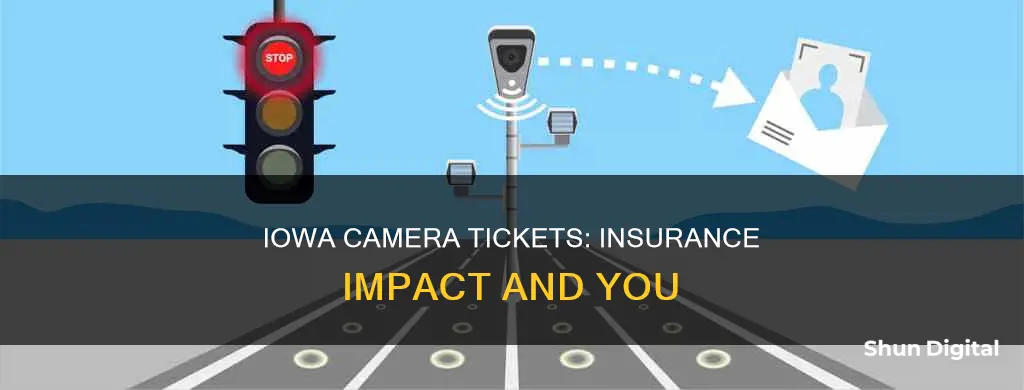
Getting a ticket for a traffic violation can be a frustrating experience, and it can be even more confusing when a camera is involved. In Iowa, red light cameras are legal and active in some regions, and drivers may be fined $100 or more if caught running a red light. While these tickets can be a nuisance, the good news is that they generally won't impact your insurance rates. This is because camera tickets are typically treated as non-moving violations, similar to parking tickets, rather than moving violations like speeding tickets. However, it's important to note that there may be other consequences for ignoring a camera ticket, such as civil penalties. So, while your insurance may not be directly affected, it's still important to follow traffic laws and be aware of the potential repercussions of any traffic violations.
| Characteristics | Values |
|---|---|
| Nature of the ticket | Civil code (municipal/city ordinance) infraction |
| Timely payment | No impact on DOT record or driver's license |
| Non-payment | Civil lien against license plates |
| Insurance impact | No direct impact on insurance |
| Fine amount | $100 or more |
What You'll Learn

Camera tickets are civil infractions
In Iowa, camera tickets are considered civil infractions or municipal/city ordinance infractions, rather than criminal violations. This means that they are treated as non-moving violations, similar to parking tickets or tickets for expired registration. These types of tickets do not result in points on your driver's license or a mark on your driving record, and therefore, they generally do not impact your car insurance rates.
In most states, camera tickets for speeding or running a red light are also considered non-moving violations and will not affect your insurance rates. However, there are a few exceptions. For example, in Arizona, California, and Oregon, red-light camera tickets are treated as moving violations, and can result in points on your license and increases in your insurance rates.
It's important to note that while camera tickets may not directly affect your insurance rates, they can still have financial consequences. If you don't pay the ticket within the specified timeframe, which is typically around 90 to 120 days, the city can impose a civil lien against your license plates. This means that when it's time to renew your registration, you will have to pay the penalty.
Additionally, while your insurance company may not be directly notified of a camera ticket, it's worth considering the potential consequences of not paying the fine. The city has several civil remedies available to collect the payment, and ignoring the ticket could result in further penalties and complications.
While camera tickets are typically handled separately from your driving record, it's always a good idea to review the specific laws and regulations in your state. Understanding your rights and responsibilities can help you make informed decisions and avoid unnecessary fines or legal issues.
Blackmagic Cameras: Where Are They Manufactured?
You may want to see also

Tickets don't go on your driving record
In Iowa, traffic camera citations are considered civil code or municipal/city ordinance infractions, not Iowa Traffic Code Violations. This means that if you don't pay a ticket within the specified timeframe (likely 90-120 days), it won't go against your DOT record or driver's license as an actual traffic ticket would. As a result, your insurance rates won't be affected, and the ticket won't go on your driving record.
While receiving a camera ticket may not impact your insurance rates or driving record, there can still be consequences for not paying. According to Black Hawk County Sheriff Tony Thompson, failing to pay a traffic camera citation can result in a civil lien against your license plates. This means that when you try to renew your registration, you will have to pay the penalty. There are also several other civil remedies available to collect unpaid fines.
It's worth noting that the above information specifically pertains to Iowa, and other states may have different laws regarding camera tickets and their impact on driving records and insurance rates. In some states, camera tickets are treated as moving violations, which can result in points on your license and increases in insurance rates. However, in Iowa, these tickets are generally treated as non-moving violations, similar to parking tickets or tickets for expired registration.
The Keystone K7 Camera: A Rare Vintage Find
You may want to see also

You can fight a ticket
In Iowa, traffic tickets are issued to motorists believed to have violated a traffic regulation. If you receive a ticket, you can choose to pay the fine or fight the citation.
If you decide to fight a ticket, you should first inform the court of your intention to do so. The citation should include instructions on how to notify the court, as well as important information such as the deadline for your response and the appropriate court to contact. You can usually contact the court in person, by phone, or by mail.
Once you have recorded your plea (not guilty), the judge will typically set a trial date. At the trial, you may be allowed to question the officer who issued the citation. If the judge's decision does not favour you, you have the option to appeal in a higher court.
It is worth noting that contesting a traffic ticket in Iowa may be worth your time and resources if you are ultimately found not guilty. Paying the fine is usually considered an admission of guilt, which could result in penalties and an increase in your insurance premium. Accumulated points on your driving record could also lead to a suspended license.
If you receive a speeding ticket, you may be able to get it dismissed by enrolling in and completing an Iowa driver improvement program. This program can also help satisfy certain traffic court requirements, prevent or reinstate a suspended license, and may even qualify you for car insurance discounts.
VGA Mode Camera: Understanding the Basics of This Technology
You may want to see also

Tickets are like non-moving violations
In Iowa, traffic violations are classified into two categories: non-moving violations and moving violations. Non-moving violations occur when a vehicle is not in motion, and common examples include parking by a fire hydrant, parking in a no-parking zone, or an expired parking meter. While Iowa doesn't use a points system for these violations, accumulating three or more violations within a year can result in consequences such as a suspended or revoked license.
Camera tickets, such as those issued for speeding or running a red light, are typically treated as non-moving violations in most states, including Iowa. This means that they are generally considered civil or administrative violations that do not result in points or become part of the driver's record. As a result, these types of camera tickets usually do not affect insurance rates.
In Iowa, a speeding camera citation is considered a civil code infraction rather than a traffic code violation. While failure to pay these tickets in a timely manner (usually within 90-120 days) will not affect your DOT record or driver's license, the city can still collect the fine through various means, such as placing a civil lien against your license plates during registration renewal.
It is important to note that while camera tickets for speeding or red-light violations are generally treated as non-moving violations, there are a few states that treat them as moving violations. These states include Oregon, Arizona, and California. In these states, camera tickets may result in points on your license, marks on your driving record, and potential insurance increases.
Activating Test Mode: Drop Tine Trail Camera Guide
You may want to see also

Tickets are sent to the car's owner
In Iowa, if you are caught speeding by a traffic camera, the ticket is sent to the owner of the vehicle. This is because a speeding camera citation is considered a civil code or municipal/city ordinance infraction, rather than an Iowa Traffic Code Violation. This means that the ticket will not go against your DOT record or driver's license.
While a speeding ticket issued by a police officer for exceeding the speed limit is considered a moving violation and will result in points on your license, a ticket issued by a speeding camera is treated differently. These camera tickets are typically classified as non-moving violations, similar to parking tickets or tickets for expired registration. As a result, they do not carry the same weight as a regular traffic ticket and will not directly impact your insurance rates.
However, it is important to note that while your insurance rates may not be directly affected, there are still consequences for ignoring a camera ticket. If you do not pay the fine within the specified timeframe, typically around 90 to 120 days, the city can take several civil remedies to collect the payment. This includes placing a civil lien against your license plates, which will result in penalties when you try to renew your registration.
The specific consequences of a camera ticket in Iowa depend on the location. For example, in Cedar Rapids, the police department utilizes the Automated Traffic Enforcement (ATE) system to enforce speed limits and red-light running at specific intersections and along Interstate 380. The fines for speeding citations issued through the ATE system in Cedar Rapids range from $75 to $500, depending on how much the driver exceeded the speed limit.
While a camera ticket may not directly impact your insurance rates, it is still advisable to take these citations seriously and pay the associated fines. Failing to do so can result in additional penalties and complications when dealing with vehicle registration and license plate renewals.
Copying Camera Raw Selections: A Step-by-Step Guide
You may want to see also
Frequently asked questions
No, they do not. Camera tickets are treated as non-moving violations, similar to parking tickets, and are not added to your driving record.
While your insurance won't be affected, failure to pay a camera ticket can result in a civil lien against your license plates, which means you'll have to pay the fine when you renew your registration.
A civil lien is a legal claim or hold on your property that allows the city to collect the fine from you.







